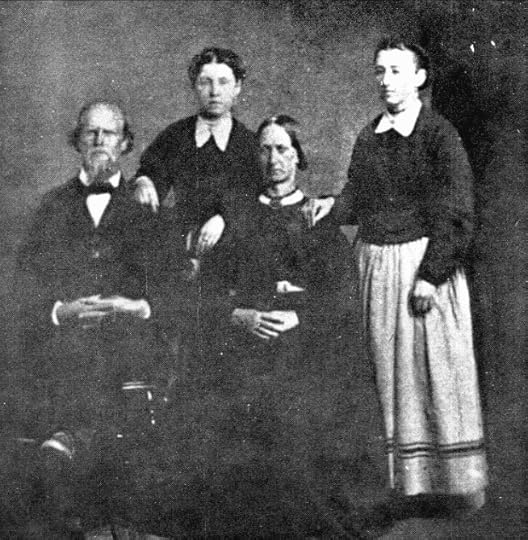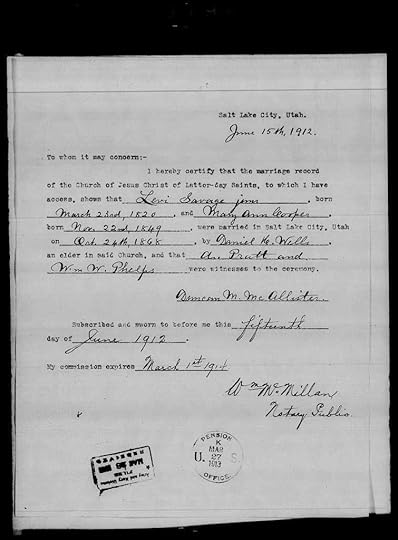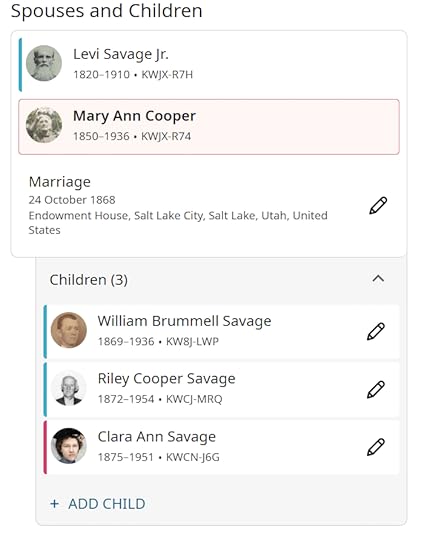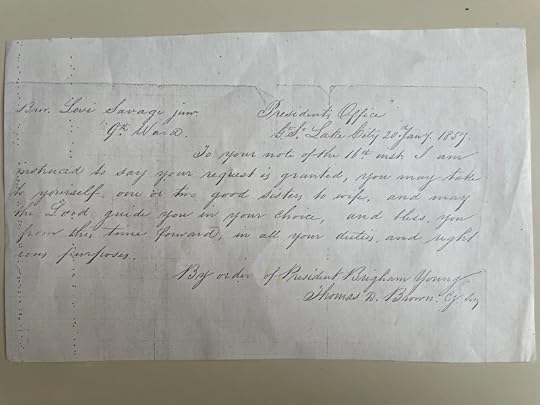Guest Post: Grappling With Legacy and Offering an Apology
Guest Post by Kate
This is not your run of the mill polygamy story. Unfortunately, it’s so much more than the usual amount of discomfort, putting things on the proverbial shelf, etc.
A friend of mine recently asked me to read through a draft of a book he was writing. His topic was leadership throughout Church history, and he included many notable and inspiring figures like Esther and Gail Halvorsen (the “Candy Bomber”). He also chose to include Levi Savage Jr. If that name sounds familiar, it’s because he’s the protagonist of the movie 17 Miracles and a real-life pioneer who helped lead the Willie Handcart Company across the plains.
I was especially excited to read that chapter. Levi Savage Jr. is my third great-grandfather.
I’ve brought that fact up in countless conversations over the years. Ever since I was a little girl, I’ve been immensely proud to be of pioneer stock and part of a multigenerational Latter-day Saint family. At Church dinners and activities, I’d often say things like, “Oh, you saw 17 Miracles? That’s my great-great-great-grandfather!” And, more often than not, someone else would chime in, “I’m related to him too!” We’d open FamilySearch, use the “Find Family Members Near Me” feature, and discover we were fifth cousins or something close.
When I learned that Levi would be featured in the book, I offered to help. I had access to a plethora of materials—his journals, newspaper clippings, photos, and other family memorabilia. But once I started digging, I discovered something deeply upsetting.
 Levi Savage and Wives
Levi Savage and WivesThe reason so many people are related to Levi is because he was a polygamist (I already knew that). He had four wives: Jane Mathers, Ann Brummel Cooper, and—this is where it gets disturbing—Ann’s two daughters from a previous marriage, Adelaide and Mary Ann Cooper.
Yes, you read that correctly. After Levi’s first wife, Jane, passed away, he married Ann Brummel Cooper, a widow with two daughters. Then, after adopting those daughters when they were just seven and nine, he later married them when they were 15 and 17.
 Proof of Levi Savage and Mary Ann’s marriage record
Proof of Levi Savage and Mary Ann’s marriage record  Adelaide Savage Obituary with proof of marriage to Levi Savage
Adelaide Savage Obituary with proof of marriage to Levi SavageAt first, I hoped this was one of those “eternity-only” sealings, a historical oddity that supposedly didn’t involve actual marital relations. But as I dug further I found he had children with (read, raped) Mary Ann, the older of the two girls.
 Mary Ann Spouse and Children
Mary Ann Spouse and ChildrenI emailed my friend immediately and told him, “Maybe you shouldn’t include Levi in your book… he’s done some pretty disgusting things.” To my surprise, he replied that he already knew. He had been wrestling with the decision of whether someone with such serious moral failings could still be held up as an example of leadership.
He made the right call and decided not to include Levi in the book.
A few days after that, I called my dad. He is very familiar with church and family history. I asked why he’d never told me about this part of Levi’s story. He looked down, ashamed, and said, “It was so weird and gross, I didn’t know how to explain it… but it was a different time, and we can’t judge…”
A familiar script played out. The thought-stopping phrases we all seem to use when faced with uncomfortable truths about leaders in church history.
I don’t blame my friend for initially wanting to include Levi in his book. And I don’t even blame my dad for trying to defend him. Because this kind of compartmentalizing happens all the time in our community.
We’ve all done it. To accept Joseph Smith’s marriages to teenagers, Brigham Young’s many wives and his racist rhetoric, or John Taylor’s views on polygamy, we have to mentally separate the “bad stuff” from the “prophetic stuff.” We shelve the uncomfortable parts so we can keep admiring the good. But if you stop shelving those things, the cognitive dissonance becomes hard to ignore. How can someone be called of God and also be a predator? And how can there be no consequences?
Levi Savage Jr. took two more wives after Brigham Young personally authorized it. Why he chose his stepdaughters, I truly don’t know. His journal has a 16-year gap around that time. His wife Ann, the girls’ mother, doesn’t mention it. The girls’ own journals are silent. The only reference I could find was in his son’s journal. Levi Mathers Savage wrote that the girls were raised like his sisters and called Levi “Father.”
 Letter from Brigham Young authorizing the polygamist marriages
Letter from Brigham Young authorizing the polygamist marriagesLike I said at the beginning of this post. This isn’t your run of the mill polygamy story. This is pedophilia. I hope by writing this I can apologize on behalf of our community to Mary Ann and Adelaide. I’m sorry no one protected you. I hope we can protect those like you going forward.
After learning all of this, I stopped bragging about being related to Levi Savage Jr. and I don’t feel pride in his story being portrayed in a movie anymore, even if it was well done by Church movie standards. I’ve chosen not to compartmentalize his life.
And maybe that’s the point.
Maybe we’re supposed to see the fallibility of the men we’ve been taught to honor. Maybe that’s why scripture includes the stories of leaders like David and Solomon who fell from grace. They were held accountable by God. So why shouldn’t we do the same with our own historical figures, family members, and church leadership?
The fearful part of me hesitates to do this as many of us are still under covenant to not “speak ill of the Lord’s anointed.” Even as I write this my brain is spinning trying to frame this from a faithful perspective. However, maybe losing faith in people is what’s needed. Alma 32:34 says “34 And now, behold, is your knowledge perfect? Yea, your knowledge is perfect in that thing, and your faith is dormant;”
I don’t need to have faith in the authority of men once my knowledge of what they did surpasses the faith I once had in their divinely issued authority.
No amount of good deeds, impressive church leadership credentials, or charisma make up for the harm someone causes. It’s not a moral transaction.
We will only move forward as a faith community if we hold everyone equally accountable, protect victims, let knowledge overcome blind faith, choose to have our eyes opened, and choose spiritual discomfort over the comfortable garden of stagnation and tradition.
Kate got her degree in Genetics and Biotech from Brigham Young University Provo. She is a mother of two, wife, and active member of the Church of Jesus Christ of Latter Day Saints. She loves anime, playing the piano, baking, and running.



